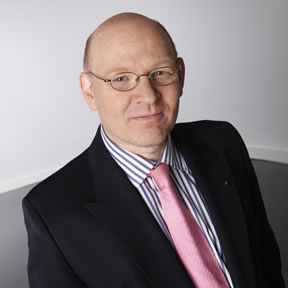Meet Father Zakaria Boutros—a gentle, thoughtful man, one of the leading figures of the Egyptian Coptic Christian community and now obliged to live in exile in the United States after twice being arrested in his homeland, and having Muslims in Iran and Saudi Arabia put a $60 million bounty on his head. While he is anonymous to most North Americans, Boutros is famous (or notorious) throughout North Africa, the Middle East, and Central Asia, where his daily television broadcasts attract enormous audiences and his website millions of hits. His style is uncompromising. Speaking in Egyptian-accented Arabic and fluent in Islamic scholarship and the various sub-cultures of the Muslim world, he carefully unwraps the layers of the Koran and the life and teachings of Mohammad and presents his viewers with a virtually unprecedented critique of their faith. It’s the combination of accessibility and originality that makes him so threatening to militant Islam.
I spoke to him shortly after the Innocence of Muslims movie trailer had been posted on YouTube back in September, leading to demonstration and violence throughout the Islamic world. “There are nineteen scenes in the film” he explained. “While it is terribly made, only one of those scenes is actually inaccurate. From their own books, their own words, they tell us that the rest is true. So why are they so angry?”
It is not something we heard, or will hear, in mainstream media. But then, Boutros is generally silenced in such circles. “Look, we know people are leaving Islam because of what I say and the Muslims know people are leaving Islam because of what I say,” he explains. A long pause, then: “People in the west simply don’t understand the significance of this in a Muslim world that has not and probably will not embrace pluralism. The Islamic response is not to argue with me but to try to kill me.”
Nor is this just the sordid reaction of wealthy fanatics and terror mobs. In 2008 the Iranian parliament passed the “Islamic Penal Code,” whereby any woman who left Islam would be punished with life in prison and any man with execution. One hundred and ninety-six parliamentarians supported the bill; seven opposed it. The world’s, including the United Nations’, reaction to that contravention of myriad international laws was screamingly silent.
Iran merely institutionalized what is already reality in Egypt, Pakistan, Sudan, Saudi Arabia, and the Gulf states. Even in areas of the Islamic world where Christianity has traditionally been tolerated, conversion is still seen as socially and morally criminal.
Egypt is a particularly troubling case because of the size of the Christian minority, the horror of their treatment and the cynical denial by the Egyptian government. There are between eight and ten million Christians in Egypt, around ten per cent of the population, and for the last thirty years in particular they have faced organized discrimination in the law, education, employment, and housing, and as a consequence leave Egypt in disproportionately large numbers. Matters have worsened rather than improved since the so-called Arab Spring.
Beyond this now regular, degrading oppression there are numerous cases of grotesque violence. In January 2000, for example, in El-Kosheh, Upper Egypt, twenty-one Christians were killed in riots by local Muslims, aided by the police. When authorities eventually reacted, they arrested more than a thousand local Christians, many of whom were tortured. There are numerous cases of Coptic girls being kidnapped by Muslim gangs and then being forcibly converted and married to Muslim men. If they flee these marriages and try to return to Christianity they are killed as apostates.
Church desecration is common, as are public burnings of Bibles and Christian literature. There are also documented cases of Christians being ritually crucified, the rape of Christian girls and the prolonged beating of children, some of them babies. These are not isolated incidents condemned by the state, but part of a recurring pattern often ignored and, in some regions, actively encouraged by police and militia. Egyptian apologists will point to certain Christians in positions of influence or, more frequently, argue that these accusations are propaganda lies told by Christians and Jews in North America and Europe.
As for Father Boutros, when I ask him if he has a bodyguard, he says he does and points his finger toward the heavens, toward God. Pray for this man; pray for all Christians living under Islam.










